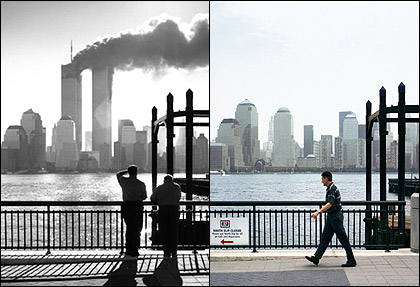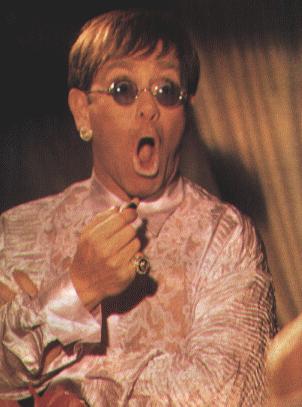tRAGEDINc.
 NEW
YORK, Sept. 11 – Declaring, “Nothing will ever be the same
again,” executives behind TragedInc opened their doors today promising
to “make Man-made disaster a P/L too fat to resist.” Using a
hub-and-spoke model, TragedInc CEO & President D. Mon summarized his
business premise as “misery in – revenue out.”
NEW
YORK, Sept. 11 – Declaring, “Nothing will ever be the same
again,” executives behind TragedInc opened their doors today promising
to “make Man-made disaster a P/L too fat to resist.” Using a
hub-and-spoke model, TragedInc CEO & President D. Mon summarized his
business premise as “misery in – revenue out.”
Standing before a giant photo of the collapsing World Trade Center and
holding up a small replica of the Statue of Liberty, D. Mon somberly called
out, “Bring us your dead, your sick, your clinically depressed and
hopeless masses.” Smiling slightly he then added, “and we’ll
turn everyone one of them into a product.”
 D. Mon
said TragedInc services would range from sepia-toned photo collections
of lost loved ones to endless replays of anything most would like to forget.
“I’m not God,” he warned holding up his flat palm. “I
can’t protect you from trouble, but I can sure help you turn a buck
after the smoke clears.”
D. Mon
said TragedInc services would range from sepia-toned photo collections
of lost loved ones to endless replays of anything most would like to forget.
“I’m not God,” he warned holding up his flat palm. “I
can’t protect you from trouble, but I can sure help you turn a buck
after the smoke clears.”
Responding to questions of whether his business might be considered offensive,
D. Mon pointed to examples of merchants already offering similar services,
citing sad-for-sale items ranging from tasteless t-shirts to lugubrious
media retrospectives. “Look at TV for starters,” he said. “From
Columbine to Ground Zero, those TV people are masters.”
The central TV lesson? “You can pretty much do or say anything as
long as you use slow motion and play really sad music.” Ticking off
a requisite menu of pity producing instruments like harps, flutes, slow
bugles and gentle guitars, D. Mon said he is planning to secure rights
to Elton John’s Candle In The Wind. “An anthem that now defines
death the same way Stairway to Heaven once defined a high-school dance.”
 Noting
that radio, newspapers, magazines, and movies also offer excellent models
for turning catastrophe to cash, D. Mon has borrowed tried-and-true media
rules for what he called his “bible of the bad” and its three-plus-one
profit driving commandments.
Noting
that radio, newspapers, magazines, and movies also offer excellent models
for turning catastrophe to cash, D. Mon has borrowed tried-and-true media
rules for what he called his “bible of the bad” and its three-plus-one
profit driving commandments. 
“First off, victims must be heroes and criminals must be cowards.
Period. Second, the tragedy must be ‘senseless,’ even if everyone
can easily figure out why it happened. Next, someone must be to blame.
If you can’t find him – and it’s always a him – just
find someone else.” Finally, D. Mon employs what he called the touchstone
of TV questions put to survivors and grieving relatives: How do you feel?
A question D. Mon called “four words that spell pay-dirt. Cha’
Ching.”
Fending off doubters, D. Mon designated his brand of mayhem marketing
as the service of the future, arguing that TragedInc simply offers a centralized
standard for delivering what is already randomly available. “Free
enterprise means everything is for sale,” said D. Mon. “My motive
is profit. My product is pity. My system is efficient. Who can argue with
that?”
